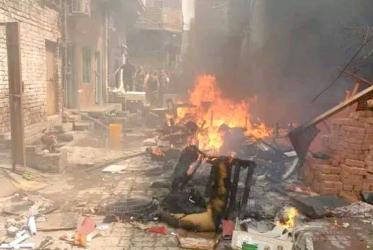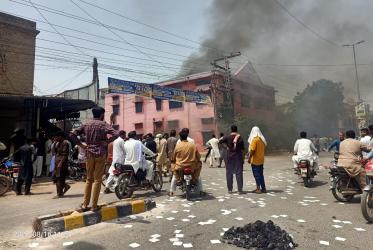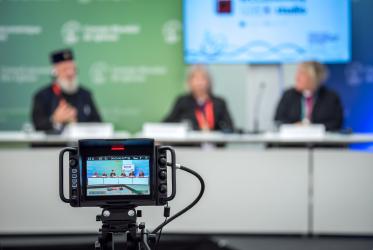1. The people of Pakistan are clamouring for political and social change. In spite of the fact that harassment and repression against people's movements have been intensified, we pray and hope that the people of Pakistan will be able to live in peace and harmony soon so that "they shall all sit under their own vines and under their own fig trees, and no one shall make them afraid" (Micah 4:4).
2. Pakistan is once again passing through an ordeal in its sixty years of independent history. The current crisis in Pakistan revolves around an array of serious problems: mounting violence; suicide attacks; bomb blasts; political repression; blatant violations of human rights; suppression of civil liberties; and the arrest and detention of lawyers, political activists, human rights activists, journalists, and trade unionists who stand for democracy and human rights. Resurgence of religious fundamentalism, the spreading of terror by extremists and cross-border terrorism are intensifying the unrest and ongoing turmoil in Pakistan.
3. Pakistan has been under the military dictatorship of President Pervez Musharraf since the then Prime Minister Nawas Sharief was ousted in October 1999. The current wave of political turmoil in the country started with the declaration of a state of emergency in November 2007 by President Musharraf. The situation is alarming as the nation faces an increase in suicide bombings and kidnappings affecting hundreds of civilians every week. The assassination of Benazir Bhutto on 27 December 2007, a leader who was committed to keeping the Federation of Pakistan together and stood against the military dictatorship, extremism and terrorism, deepened the crisis facing the country.
4. Rule of law is absent in the country. The legal justice system is paralyzed due to the lack of independence of the judiciary and dismissal of the chief justice and other judges. The country-wide judicial crisis has caused a major setback and paralysis of governance, which has in turn affected all areas of life. Arbitrary arrests, detentions and ill-treatment of lawyers; keeping judges and lawyers in continuous detention; and the use of force against protesting lawyers exemplify the fact that the present government has not been committed to resolving the judicial crisis. People's movements calling for reforms, especially the courageous movement of Pakistani lawyers and people, were able to overthrow the decision of the military ruler and restore the chief justice (who had been fired by the military ruler), achieving the upholding of constitutional values for a brief stint. However, the judiciary continues to remain vulnerable and powerless.
5. Even though President Musharraf opted out of his military position, his government continues to lose public support and legitimacy to remain in power. Despite his declining credibility and legitimacy to rule, the United States' administration continues its support of President Musharraf. Since 11 September 2001, the US military aid to Pakistan and the deepening US involvement in the country have been justified as part of the US "war on terror".
6. The Pakistani military has played an influential role in mainstream politics in Pakistan's history, with army generals ruling from 1958-1971, 1977-1988, and from 1999 onwards. The democratic process in Pakistan has been in peril while the army remains a central player in the politics. The outcome to date of the results of the elections held on 18 February is encouraging, and we very much hope this shows a return to democratic governance in Pakistan.
7. It is heartening that the churches and faith communities in Pakistan have come forward to respond to the deteriorating situation in the country and to condemn the violence, terrorism and all other forms of dehumanizing measures. We believe that human life is a gift of God and any action which threatens life is contrary to the noble values to promote peace, love and forgiveness. All faith communities and civil society groups in Pakistan have a responsibility to their people to respond to the challenge posed by any forces that destroy God's gift of life.
The central committee of the World Council of Churches, meeting in Geneva from 13-20 February 2008, therefore:
A. Reiterates the commitments of the churches to defend human rights, seek justice and promote peace;
B. Expresses its solidarity with the suffering people of Pakistan, especially all those who are bereaved on the loss of their family members;
C. Expresses its deep concern at the deteriorating situation which destroys peace and security and increases conflicts and violence in Pakistani society;
D. Expresses its condolences to the Bhutto family and the people of Pakistan on the assassination of Mrs. Benazir Bhutto;
E. Welcomes the election recently concluded in Pakistan and encourages the strengthening and developing of democratic processes in the country;
F. Urges the government of Pakistan to order an independent and impartial inquiry into the circumstances of Mrs. Bhutto's death and to bring to justice all those responsible for the heinous crime;
G. Calls for restoration of democracy, civil rights and rule of law in Pakistan, and urges the government of Pakistan to release all political prisoners and human rights activists;
H. Calls on the incoming elected government of Pakistan to ensure the safety and security of all political leaders, human rights activists and minority religious communities in Pakistan;
I. Calls on churches around the world to continue to pray for peace and reconciliation in Pakistan;
J. Affirms strongly the interfaith initiatives by the Church of Pakistan to mobilize non-violent responses to acts of terrorism by building a culture of peace and interfaith harmony in the country;
K. Assures the solidarity of the WCC to its member constituencies in Pakistan in their efforts to work on peace, reconciliation and communal harmony in the country.



